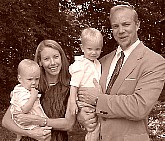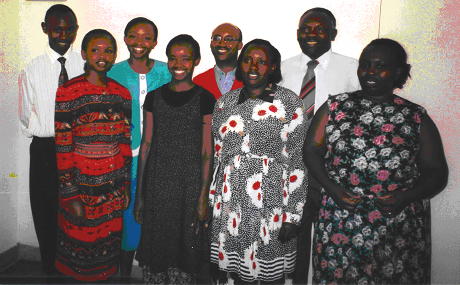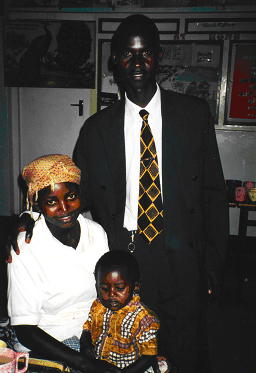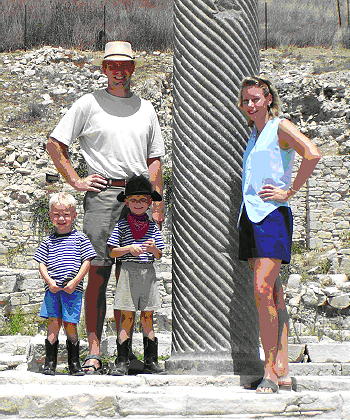The Hoyers in Transit
Posted March 12, 2004
Living overseas in some of the more far-flung corners of the globe has been a bit of a challenge, but it has also brought us in contact with a few of our scattered brethren.
|
|
| Kurt and Jennifer Hoyer, members of UCG, have served overseas for the Department of State since 1999. They have a special story to tell. They have worked in Mexico and Kenya. They are currently in Cyprus where there are no other brethren. If you would like to email them, their email address is hoyers@pobox.com. |
Merida, Mexico sits in the sweltering flat lands of the Yucatan peninsula. This city was once the headquarters of the Sisal trade. The glory of those days can still be seen in the old mansions now occupied by banks and law offices, or glimpsed in courtyards through ramshackle doorways like fragments of pleasant dreams forgotten upon waking. Merida is enjoying a second lease on life as old haciendas are converted to luxury spa hotels catering to wealthy eco tourists eager to see the nearby Mayan ruins of Chichen Itza and Uxmal.
Merida was our home for two years. Our closest brethren, so we thought, lived 3 hours away in Cancun. Yanin Torres had lived in Cancun for several years with her husband, who worked in the restaurant industry, and their two boys. Her husband grew up knowing about the church but had subsequently stopped attending. It was his parents that gave Yanin her first contact with God’s way of life.
We managed to spend a few Sabbaths and Holy Days with her, helped her celebrate her first Night to be Much Observed, and her first two Passovers. We were also able to lend support when her oldest son succumbed to life-long health problems and died. Throughout her hardship she showed a depth of faith and understanding about God’s plan that only the Holy Spirit could provide.
If you speak Spanish and find yourself in Cancun, Yanin would be most delighted to visit with you.
 |
|
A couple of weeks before we left we met Elenita de Diego, a long-time church member who had been living in Merida for a number of years. It just goes to show that even in this age of the internet, wires can get crossed and information lost. At least we were able to connect Yanin and Elenita so that they now spend Holy Days together.
One of the reasons we chose an assignment in Nairobi, Kenya afterwards was the chance to fellowship with a large congregation of nine people. Kenyans are known for their friendliness and we found that reputation to be well deserved by the brethren.
|
|
|
Most of our brethren in Kenya live in the Western part of the country, with over 100 people in regular attendance in four different locations. It is hard to think of a more difficult place to live than the areas around Lake Victoria. It is the breeding ground for almost all types of Malaria, one of which can kill in a number of hours. Almost every mother we met had lost at least one child to this or a host of other illnesses. Aside from disease, crushing poverty brought on by over 30 years of corrupt governance leaves many of the villagers with two choices for life. They can farm their small plots, and in this fertile country grow enough to keep the family alive, but they then have no job to work for the money for clothing, school fees, and other necessities of life. Or they can try to get a job to participate in the money economy but then not earn enough to buy food they need to eat.
Here the brethren need ideas, training, and seed money to start and maintain small businesses.
|
|
We helped John Owak make contacts in Nairobi to buy inexpensive, used clothing for resale at his tailor shop. (Most of the world’s discarded, or unsold clothing is shipped to Africa, so sending free clothes would put John out of business.) Building a business is not an easy thing. Interests rates are too high to make a loan feasible. Pooling resources usually results in someone running off with the cash. Habitat for Humanity which provides micro loans for people to buy houses, if they help in the construction, normally has an 80% repayment rate. In Kenya it is 20%.
One man’s example
Joseph Kihara, a member since the 1970’s died while we were in Kenya. I conducted the funeral at the family farm in the highlands of central Kenya. It was a well-attended affair. Local notables from the village, the family, (his father had two wives) extended family, all combined to make over 100 people. At one point various groups were called up to have their picture taken with the coffin. First it was family, extended family, clan members etc. The last group called up was “Good News subscribers”. Joseph was known to his neighbors as a ‘Godly’ or ‘kind’ man. He would loan his literature out to those who requested it, the church bought him a tape player so that he could play sermon tapes and interested people from the villages would come to his house to listen. His family turned his small house into a sort of library after his death where people could borrow the literature he had. Not long after his death we began to get visit requests from the local village. Shortly thereafter we had a regular group of several families meeting.
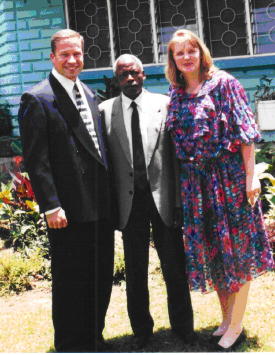 Joseph Kihara with Dan and Renea Apartian at Festival 2000 |
In another town not too far away Martha began getting interested after attending one Feast. Soon we had another small group meeting. By the time we left in June 2003 these groups were meeting together once a month, total attendance over 20 with several baptisms.
I was glad to have 4 wheel drive when doing these visits, especially during the rainy season. We forded many streams and wallowed through thick mud to meet people in their homes.
When Joseph was buried each person who was at the funeral took turns with the shovel throwing dirt on the casket to fill the grave. People who had dressed in their finest clothing lined up for this opportunity to show their last respects. I would like to think that at the resurrection some of those same people will be at the grave site to show their gratitude for introducing them to the Truth.
While Nairobi is generally better off than the rest of the country, there is still a shortage of jobs. Jennifer arranged for the purchase and shipment of two computers to two of the brethren so that they could learn computer skills for better employment chances. She also used her contacts to find a job for one of the young single women with training in fashion design.
Volunteer opportunities abound in developing countries, prompting Jennifer to get involved and accept a board position in the American Women’s Association of Kenya. The AWA provides grants to women’s self-help businesses, and food to orphanages, elder care programs and AIDS sufferers. “After living in Nairobi for ten months, Kenya seemed hopeless…the corruption and deteriorated infrastructure (of this otherwise splendid country) were overwhelming. After getting involved with the AWA, I was able to serve people and I could really make a difference.”
If anyone asked us now what the Africans need most, we would say they need books. Books bring vision, and “without vision the people parish”, as was evidenced every day we lived there.
|
|
We hoped that we would not be sent to another posting which was without a church. However, it seems that God has something else in mind for us, as we’re now in Cyprus where there are just a few scattered Good News readers. We have contacted various church groups to see if anyone is presently listed as members, with no success. So once again we are the scattered brethren, looking for believers with whom to share a common faith. As Cyprus was one of the Apostle Paul’s stops, perhaps we will discover more than ruins of the previous empirical occupations, but survivors of the original faith once delivered.
Perhaps....
